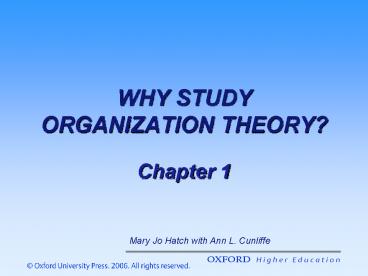WHY STUDY ORGANIZATION THEORY? - PowerPoint PPT Presentation
1 / 19
Title:
WHY STUDY ORGANIZATION THEORY?
Description:
WHY STUDY ORGANIZATION THEORY? Chapter 1 Mary Jo Hatch with Ann L. Cunliffe Table 1.1 Some Applications of Organization Theory Structuring activities and designing ... – PowerPoint PPT presentation
Number of Views:2395
Avg rating:3.0/5.0
Title: WHY STUDY ORGANIZATION THEORY?
1
WHY STUDY ORGANIZATION THEORY?
- Chapter 1
Mary Jo Hatch with Ann L. Cunliffe
2
Table 1.1 Some Applications of Organization
Theory
- Structuring activities and designing
organizational processes to - Strategy/Finance Support goal achievement
performance monitoring. - Marketing Align the organization its brand
strategy. - Information Align information flows with work
processes - Technology outcomes.
- Operations Support value chain management.
- Human Resources Provide a basis for HRM
activities,organizational - development change.
- Communication Design effective communication
processes.
3
A theory . . .
- consists of a set of concepts and the
relationships that tie them together into a
coherent explanation or understanding of the
phenomenon of interest
4
Cultural Studies
Literary Theory
Poststructural Philosophy
Postmodern Architecture
Linguistics
Semiotics and Hermeneutics
Folklore Studies
Cultural Anthropology
Social Psychology
Biology-Ecology
Political Science
Sociology
Engineering
Economics
PREHISTORY 1900-1950s
MODERN 1960s 70s
SYMBOLIC- INTERPRETIVE 1980s
POSTMODERN 1990s
Smith (1776) Marx (1867) Durkheim(1893) Taylor
(1911) Follett (1918) Fayol (1919) Weber
(1924) Gulick (1937) Barnard (1938)
Von Bertalanffy (1950) Trist Bamforth
(1951) Boulding (1956) March Simon (1958) Emery
(1960) Burns Stalker (1961) Woodward
(1965) Lawrence Lorsch (1967) Thompson (1967)
Schutz (1932) Whyte (1943) Selznick
(1949) Goffman (1959) Gadamer (1960) Berger
Luckmann (1966) Weick (1969) Geertz
(1973) Clifford Marcus (1986)
Saussure (1959) Foucault (1972) Bell
(1973) Jencks (1977) Derrida (1978) Lyotard
(1979) Rorty (1980) Lash Urry
(1987) Baudrillard (1988)
Fig 1.1 Sources of inspiration for organization
theory
5
Theoretical Perspectives
- Theories linked by similar underlying
assumptions, logics, and vocabularies. - Research adopting similar approaches, methods,
and ways of theorizing.
6
Theory (built from a selected set of concepts to
explain, understand, criticize or create the
phenomenon of interest)
analysis and association
Concepts (categories for sorting, organizing,
storing information, formed from common features
of specific instances)
abstraction
Phenomena of Interest (what is to be explained,
understood, criticized or created by the theory)
7
Abstraction
- The process of removing the unique details of
particular examples so that only their common
aspects remain. - Enables us to process and communicate more
information.
8
Abstract
All Living Things
Plant
Animal
Reptile
Mammal
Bird
Dog
Cat
Fido
Spot
Phydough
Spought
Concrete
9
Paradigms
- A set of assumptions and practices that define a
scientific discipline (Kuhn). - A way of seeing and thinking about the world.
10
Why Multiple Perspectives?
- Help better understand and manage the complexity
of organizations. - Become more aware of the assumptions underlying
theory and practice and the reasons for doing or
not doing things. - Form a basis for determining pressures to act and
their relationship to ethical, efficient, and
socially responsible action.
11
Ontology
- Ontology concerns our assumptions about reality
and agency - is there an objective reality out there or
is it subjective, - existing only in our minds?
- are our actions predetermined or do we have
- freewill?
12
Epistemology
- Epistemology is concerned with knowledge
- how we generate knowledge
- what constitutes good knowledge
- how we represent or describe reality
13
Comparing Ontologies
- Objectivism the belief in an objective,
external - reality that exists independently of
- our knowledge of it.
- Subjectivism the belief that knowledge of the
- world is subjective and that social
- reality only exists when we
- experience it and give it meaning.
14
Comparing Epistemologies
- Positivism we can discover Truth through the
- scientific measurement and
- validation of behavior systems.
- Interpretivism all knowledge is relative to
the - knower can only be understood
- from the point of view of individuals
who are directly involved truth is socially
constructed.
15
Modernist Perspective
- Objectivist ontology
- Positivist epistemology
- Organizations are real,
- rational entities and
- systems
- Organization theorists focus on finding
universal laws governing system
behavior, rational structures,
standardized procedures
16
Symbolic-Interpretive Perspective
- Subjectivist ontology
- Interpretivist epistemology
- Organizations are communities, socially
constructed in everyday interactions - Organization theorists study how people
create and give meaning to their
experience of organizational life
17
Postmodern Perspective
- Ontology - the social world is created
through language discourse - Epistemology - there is no Truth
- knowledge power are interwoven
- Organizations are texts - sites of power
relations, marginalization, and play - Organization theorists deconstruct destabilize
ideologies rational forms of organizing
encourage a reflexive questioning of taken
for granted assumptions practices
18
Poststructuralist Ideas
Power
Privileged
Knowledge
Other knowledge
Binary
19
Environment
Culture
Social
Physical
Structure
Structure
Technology
Fig. 1.2 A Conceptual Model Of Organization.































